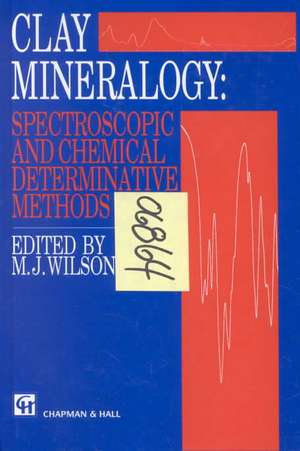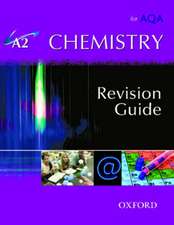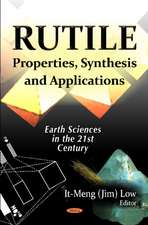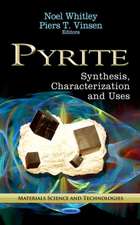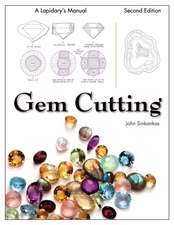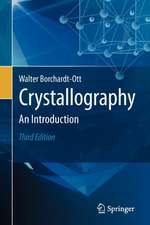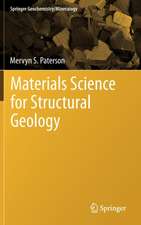Clay Mineralogy: Spectroscopic and Chemical Determinative Methods
Editat de M.H. Repacholien Limba Engleză Hardback – 31 mar 1994
| Toate formatele și edițiile | Preț | Express |
|---|---|---|
| Paperback (1) | 1220.88 lei 6-8 săpt. | |
| SPRINGER NETHERLANDS – 17 sep 2012 | 1220.88 lei 6-8 săpt. | |
| Hardback (1) | 1227.04 lei 6-8 săpt. | |
| SPRINGER NETHERLANDS – 31 mar 1994 | 1227.04 lei 6-8 săpt. |
Preț: 1227.04 lei
Preț vechi: 1496.40 lei
-18% Nou
Puncte Express: 1841
Preț estimativ în valută:
234.80€ • 251.08$ • 195.77£
234.80€ • 251.08$ • 195.77£
Carte tipărită la comandă
Livrare economică 18 aprilie-02 mai
Preluare comenzi: 021 569.72.76
Specificații
ISBN-13: 9780412533808
ISBN-10: 0412533804
Pagini: 367
Ilustrații: XI, 367 p.
Dimensiuni: 155 x 235 x 22 mm
Greutate: 0.71 kg
Ediția:1994
Editura: SPRINGER NETHERLANDS
Colecția Springer
Locul publicării:Dordrecht, Netherlands
ISBN-10: 0412533804
Pagini: 367
Ilustrații: XI, 367 p.
Dimensiuni: 155 x 235 x 22 mm
Greutate: 0.71 kg
Ediția:1994
Editura: SPRINGER NETHERLANDS
Colecția Springer
Locul publicării:Dordrecht, Netherlands
Public țintă
ResearchCuprins
1 Molecular spectroscopy: introduction and general principles.- 1.1 Background.- 1.2 Absorption spectroscopy.- 1.3 Emission spectroscopy.- 1.4 Spectral intensity.- 1.5 Spectral peak widths.- 1.6 Spectral resolution.- 1.7 Signal-to-noise optimization.- 1.8 Spectral editing and analysis.- Acknowledgement.- 2 Infrared methods.- 2.1 Introduction.- 2.2 Principles.- 2.3 Instrumental requirements.- 2.4 Preparative methods and pretreatments.- 2.5 Identification and characterization of clay minerals and associated minerals.- 2.6 Interpreting the IR spectra of clay materials.- 2.7 Quantitative analysis.- 2.8 Computer-aided methods.- Acknowledgement.- References.- 3 Mössbauer spectroscopy.- 3.1 Introduction.- 3.2 Principles of Mössbauer spectroscopy.- 3.3 Instrumentation and experimental techniques.- 3.4 Mössbauer spectroscopy of oxide minerals.- 3.5 Mössbauer spectroscopy of aluminosilicate minerals.- 3.6 Phosphate minerals.- 3.7 Applications of Mössbauer spectroscopy in archaeology and art.- 3.8 Conclusions.- Acknowledgements.- References.- 4 Nuclear magnetic resonance spectroscopy.- 4.1 Introduction.- 4.2 Principles of NMR spectroscopy.- 4.3 Experimental techniques.- 4.4 General features of MAS NMR spectra of minerals.- 4.5 High-resolution NMR spectroscopy of clay minerals.- 4.6 Clay surface studies.- 4.7 Structural distribution of paramagnetic ions.- 4.8 Conclusions.- Acknowledgements.- References.- 5 Electron paramagnetic resonance spectroscopy.- 5.1 Introduction to electron paramagnetic resonance.- 5.2 Electrons in transition metal ions.- 5.3 The case of two or more unpaired electrons: fine structure.- 5.4 Nuclear hyperfine coupling.- 5.5 Experimental procedures.- 5.6 Applications.- 5.7 Conclusions.- Acknowledgements.- References.- 6 X-ray photoelectron spectroscopy.-6.1 Introduction.- 6.2 Fundamental aspects.- 6.3 Experimental aspects.- 6.4 Information content.- 6.5 Applications in clay mineralogy.- 6.6 Conclusions.- Acknowledgements.- References.- 7 X-ray fluorescence spectroscopy and microanalysis.- 7.1 Introduction.- 7.2 General principles.- 7.3 X-ray fluorescence spectrometry.- 7.4 Microanalysis with SEM.- 7.5 Analytical electron microscopy.- 7.6 Conclusions.- Acknowledgement.- References.- 8 Chemical analysis.- 8.1 Introduction.- 8.2 Sample preparation.- 8.3 Methods of major elemental analysis.- 8.4 Analysis for ferrous iron.- 8.5 Exchange capacity.- 8.6 Determination of a structural formula.- References.- 9 Characterization of poorly ordered minerals by selective chemical methods.- 9.1 Introduction.- 9.2 Principles.- 9.3 Selective chemical methods.- 9.4 Comparison of methods.- References.
Recenzii
Strikes a reasonable balance between spectroscopic concepts and analytical practice while providing a compendium of research findings specific to clay mineralogy...useful to veteran scientists as well as those seeking an introduction to certain aspects of clay science - Journal of Environmental Quality; The book is likely to prove a useful reference for those interested in clays and related mineralogical applications...this book is a useful and timely reference work - Journal of the Russell Society; An excellent book selection of a technique. It should feature on the shelf of every clay scientist. It can also be used for course work at the graduate level - Geoscientist; ...concisely, yet clearly written and is easy to read. I am sure it fulfils expectations of students and scientists wanting to use spectroscopic methods in clay research. - Geologica Carpathica - Clays.; ...for those seriously interested in clay minerals it will prove to be of great use. - Geological Magazine; ..particularly useful for those who are familiar with the problems of investigating clay minerals, but need a fresh review on appropriate spectroscopic or chemical analytical methods. This book is very well organised, and the quality of printing is excellent...institutional libraries ought to have one on hand. - The Canadian Mineralogist; ...of great value. It provides in one volume a good compilation of basic information that would otherwise be available only from a variety of different sources...I am sure that it will soon be on the shelves of many libraries and part of the book collections of clay mineralogists and soil scientists. - Mineralogical Magazine
